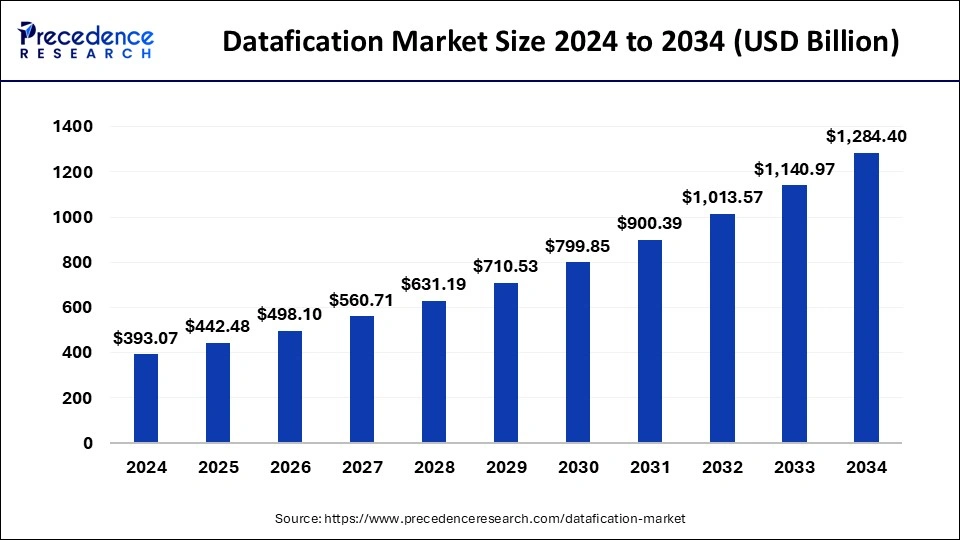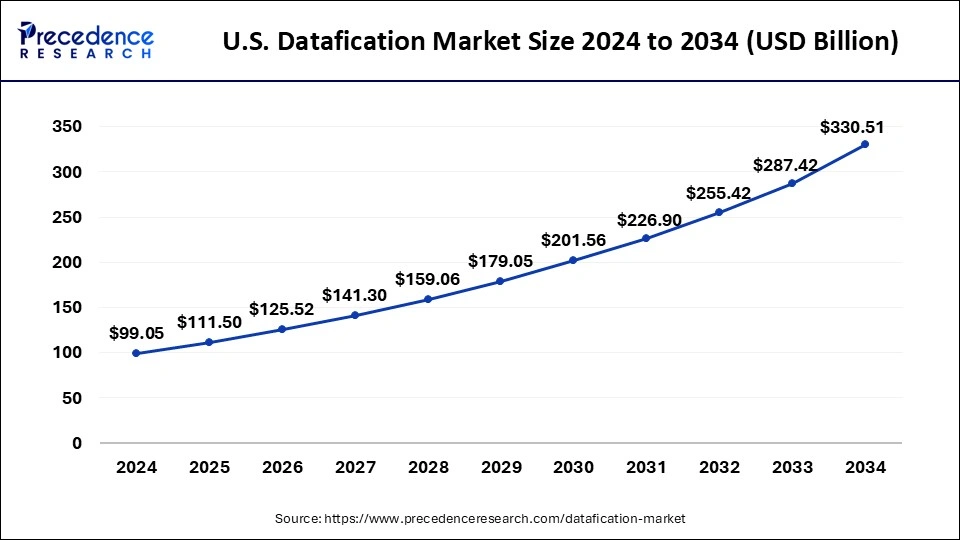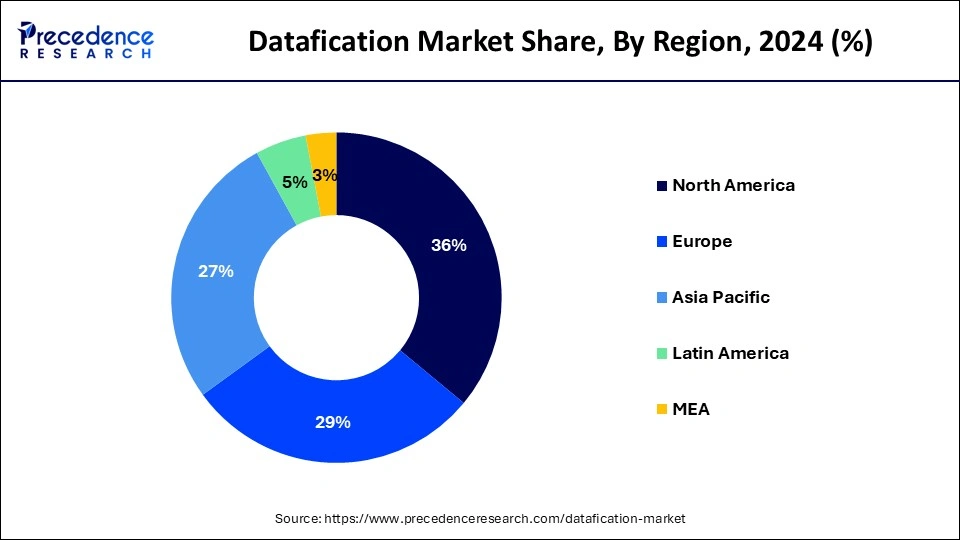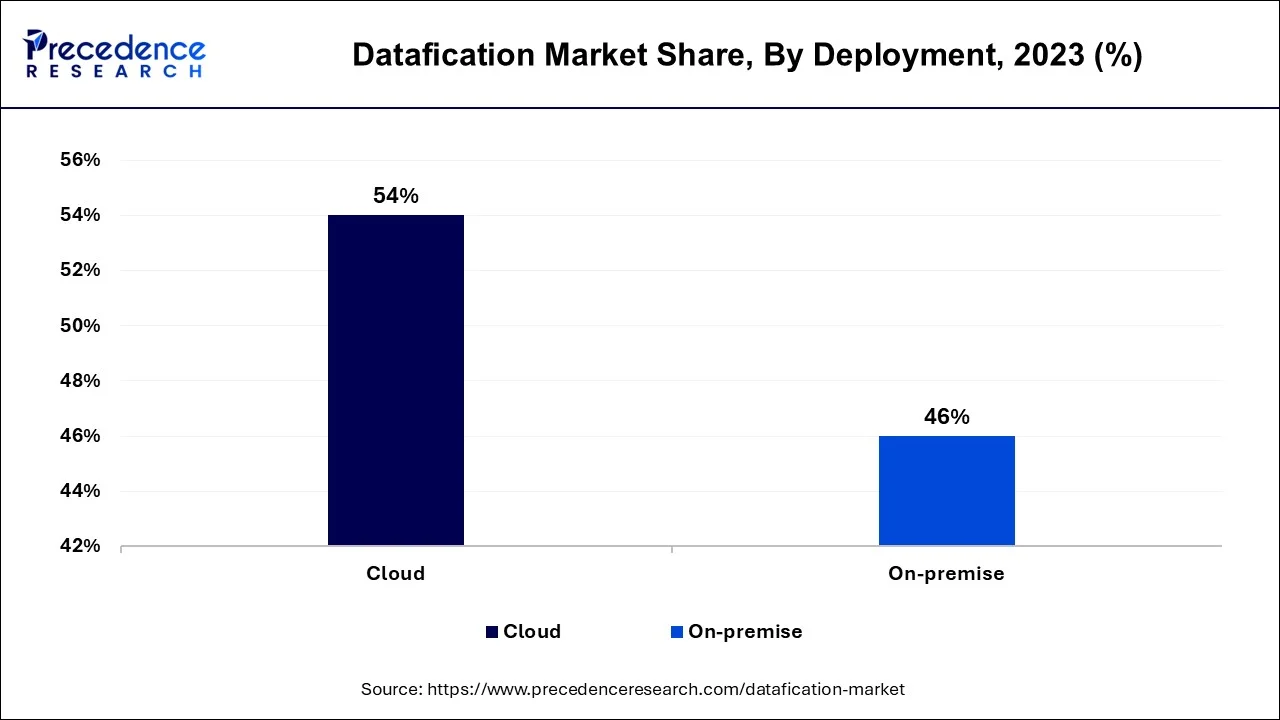Datafication Market Size and Forecast 2025 to 2034
The global datafication market size was estimated at USD 393.07 billion in 2024 and is predicted to increase from USD 442.48 billion in 2025 to approximately USD 1,284.40 billion by 2034, expanding at a CAGR of 12.57% from 2025 to 2034.

Datafication Market Key Takeaways
- North America dominated the market with the largest market share in 36% in 2024.
- Asia Pacific is expected to expand at the fastest rate during the forecast period.
- By Deployment, the cloud segment dominated the market with the largest market share of 54% in 2024.
- By Deployment, the on-premises segment is expected to generate a notable revenue share during the predicted timeframe.
- By End-user, the healthcare segment dominated the market with the largest market share in 2024.
- By End-user, the retail segment is expected to significantly boost during the anticipated timeframe.
U.S. Datafication Market Size and Growth 2025 to 2034
The U.S. datafication market size is estimated at USD 99.05 billion in 2024 and is predicted to be worth around USD 330.51 billion by 2034, growing at a CAGR of 12.80% from 2024 to 2034.

North America dominated the market with the largest market size in 2024, the region is expected to hold the largest share of the market during the forecast period. The growth of the region is attributed to the increasing industrial infrastructure in the region. Increasing industrial development requires handling and managing an enormous amount of data for improving the productivity and efficiency of the organization. The growing adoption of technology for the management of data will end up in the growth of the datafication market across the region. The presence of large-scale organizations and willingness to adopt automation systems such as machine learning, robotics, and artificial intelligenceare a few other factors that highlight the growth of the market.

Asia Pacific is expected to witness significant growth in market revenue during the forecast period. The growth of the region is attributed to the increasing number of several industries like automobile, healthcare and manufacturing. These booming industries need the technological backbone to manage their operational data which is useful for expanding industry's growth. The increasing need for datafication technology in research and development activities in many sectors such as biotechnology and pharmaceutical sectors will enhance the growth of the datafication market across the region.
Market Overview
Datafication is generally known as analyzing and collecting data to give accurate insights for an efficient decision-making process. Datafication is widely used by several organizations and industries. Datafication allows companies to know the consumer's needs, predict outcomes, identify trends, and optimize processes. With technological advancement, datafication is observed to be emerging in a sophisticated manner. Datafication is used to deeply analyze consumer behavior, future market demand and create precise yet profitable decision-making processes for the industries.
Many industries are using datafication technology for their effective and faster workflow with accurate market forecasting, and decision-making processes in the field of inventory, logistics, and supply chain management, etc., the datafication process enhances the productivity and performance of the industry in every other sector, thus the datafication market expected to increase significantly during the forecast period.
Datafication Market Growth Factors
Datafication is the process that converts information into data and makes it actionable and accessible. Datafication works for collecting, analyzing and organizing the information in such a manner that will be useful for the market forecasting and decision-making process. The enormous demand for storage and management of data from industries and large-scale organizations creates a significant driver for the growth of the datafication market. Datafication technology is prominently used by major industries for the storage and management of their data while utilizing a number of techniques that allow for datafication. Predictive analytics is a well-liked method that forecasts client behavior using massive amounts of data.
Other approaches include machine learning, which enables computers to learn from massive datasets to anticipate future behavior and natural language processing, which enables computers to comprehend data created by humans. These technologies allow businesses to get important information about client preferences and behavior. By adjusting techniques in response to client feedback or seeing emerging trends in their sector that may spur expansion, marketers may also use data to improve their plans. All these factors create benefits for the industries, that are likely to act as a growth factor for the market.
Market Scope
| Report Coverage | Details |
| Market Size in 2034 | USD 1,284.40 Billion |
| Market Size by 2025 | USD 442.48 Billion |
| Market Size by 2024 | USD 393.07 Billion |
| Growth Rate from 2024 to 2034 | CAGR of 12.57% |
| Largest Market | North America |
| FGastest Growing Market | Asia Pacific |
| Base Year | 2024 |
| Forecast Period | 2025 to 2034 |
| Segments Covered | Deployment, End-User, and Region |
| Regions Covered | North America, Europe, Asia-Pacific, Latin America, and Middle East & Africa |
Market Dynamics
Drivers
Improves accuracy and minimizes the cost
Datafication enables the speedy processing of massive amounts of data and prompt access to the information. As a result, organizations can react more swiftly to alterations in the market or in client demands. Information that has been datafied is more accurate than information that has been manually entered since it removes errors brought on by erroneous or incomplete information owing to human error as well as inconsistent data formats and interpretations. Accuracy, quality assurance, and customer happiness are ultimately improved. Organizations that employ datafication can save money by using automated systems and techniques instead of human ones for data entry, storage, and processing. Significant operating expense reductions may also follow from this.
Restraint
Concerns with cybersecurity
Although there are many driving factors for the datafication market, there are threats to the growth of the market including cybersecurity. Cybersecurity is the major challenge to overcome in the datafication market. Storage of huge data, especially sensitive data in multiple sectors including healthcare, retail and IT industries is prone to get leaked, breached or attacked by hackers. Thus, the risk of cybersecurity with datafication activities create a major restraint for the market.
Opportunity
Integration of FinOps
Across an organization, managing financial activities is known as financial operations management (FinOps). Everything from predicting to risk management to budgeting is part of finOps. Reporting on finances is no longer a concern. The scope of FinOps extends beyond financial reporting. The integration and analysis of data that was previously compartmentalized in many systems is made possible by datafication, which is crucial in this situation. This new generation of technology has been referred to as fintech, where financing and technology are combined. As companies and organizations adopt cloud computing methods to manage data, the penetration of FinOps for the same is expected to grow. This element opens up multiple opportunities for the market to grow.
Deployment Insights
The cloud-based segment dominated the market with the largest market share in 2024. The dominance of the segment is attributed to the rising use of cloud technology for better management and analysis of data. In most of the cases, industries are seen using cloud technology for maintaining an enormous amount of data from any platform owing to its easy accessibility. With the use of cloud computing in data science it is now possible to evaluate a larger amount of data that can be analyzed, stored, and maintained easily and effectively. Cloud computing is very beneficial at the stage of transferring data from the database to the local machines and then proceeding to work on it. Cloud computing reduces the challenge of moving petabytes of data manually. In recent years, many large-scale organizations have accepted cloud-based technology to expand their business units and productivity.

The on-premise segment is expected to show steady growth during the forecast period. On-premises data center refers to a group of servers that can be managed and controlled privately. An on-premise deployment is a traditional way to manage the data for organizations. It is a technology and software established within the physical confines of an organization, often in the company's data center. Companies with a huge amount of data and the presence of human agents to manage the same are more likely to choose the on-premises deployment model.
End-User Insights
The healthcare segment dominated the market with the largest revenue in 2024, the segment will continue to share a significant revenue throughout the forecast period. The growth of the segment is increasing due to the improving healthcare infrastructure across the world, especially in developing countries. It is shown that the healthcare industry carries a vast amount of data for analyzing various purposes like curing disease, epidemic prediction, avoiding preventable deaths, and increasing the quality of life.
The dominance of the healthcare sector as a major end-user in the industry is due to the ever-rising population across the world and the increasing need for medical and healthcare services, these elements have forced the healthcare industry to adopt innovative and latest technology for transmission and management of operations. Technology would be strengthened due to the amount and quality of data which is available by the healthcare sector for better research and treatment. This big data can be managed by datafication technology. These factors contribute to the growth of the datafication market in the healthcare industry.
On the other hand, the retail segment is expected to witness a notable growth during the forecast period. The growth of the segment is attributed to the rising disposable income of the population across the world that is supporting the growth of e-commerce and overall retail sector. The rising e-commerce industry has the bulk amount of customer data to be managed. Datafication plays a major role in the analysis and management process in e-commerce by analyzing the needs, trends, and demands of the customers for better profitability and productivity in the industry.
Datafication Market Companies
- Johnson Outdoors
- Hilleberg
- Gelert
- Force Ten
- Exxel Outdoors
- The Coleman Company
- Simex Outdoor International
- Oase Outdoors
- North Face, Inc.
- Newell Brands
- Khyam
- Kampa
- AMG GROUP
Recent Developments
- In July 2023, a globally leading technology company “HCLTech” launched of HCLTech Advantage Analytics, it is an artificial intelligence business solution that provides Snowflake's Data Cloud offering services to organizations for integrating artificial intelligence with business intelligence for business outcomes and increasing customer experience.
- In July 2023, RADCOM launched the RADCOM ACE platform's cloud-native RADCOM Virtual Drive Test solution for 5G to significantly enhance the national mobility experience, and reduce drive test costs, for the improvement of 5G service coverage 24/7 on real user insights.
- In July 2023, KPM Analytics announced the launch of the rollout of KPMLink a cloud-based specifically designed software for the remote management of its SpectraStarâ„¢ XT series Near-Infrared (NIR) analyzers.
Segments Covered in the Report
By Deployment
- Cloud
- On-Premises
By End-User
- BFSI
- Healthcare
- IT & Telecom
- Retail
- Education
- Government
By Geography
- North America
- Europe
- Asia-Pacific
- Latin America
- Middle East and Africa
For inquiries regarding discounts, bulk purchases, or customization requests, please contact us at sales@precedenceresearch.com
Frequently Asked Questions
Ask For Sample
No cookie-cutter, only authentic analysis – take the 1st step to become a Precedence Research client
 Get a Sample
Get a Sample
 Table Of Content
Table Of Content
 sales@precedenceresearch.com
sales@precedenceresearch.com
 +1 804-441-9344
+1 804-441-9344
 Schedule a Meeting
Schedule a Meeting